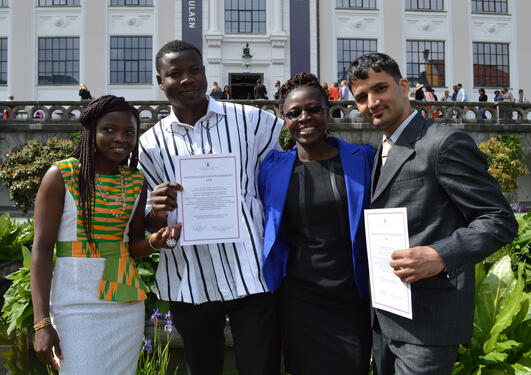Food security and the COVID-19 crisis: the importance of cross-border fish trade
In her master's thesis, Maïlys Rouillé studies the important contribution of cross-border fishtraders to food security in Ghana and its surrounding countries during the COVID-19 crisis.

Main content
Since the coronavirus outbreak, the possibility of a food crisis and the threat of food insecurity are more and more alarming. Border closures and taxes on imports and exports are making food trade difficult, especially for informal traders in developing countries. The fishery sector suffers from indirect impacts of the pandemic through changing consumer demand, market access, increase in prices and logistical problems related to transportation and border restrictions. This situation has damaging effects on food security both directly for populations who rely on fish as protein and micronutrient source, and indirectly for actors along the supply chain whose livelihood depend on fish production and trade.
Cross-border fishtraders contribution to food security
Informal cross-border trade in Ghana and in West Africa in general is known for its resilience, where traders, mostly women, are part of large social networks and have knowledge of areas where fish is most needed. Traders’ resilience was and is challenged during the COVID-19 crisis. This study will reflect on whether the trading system was resilient enough to withstand such a shock or if its resilience has limits.
About 43% of Africa’s population depend on the incomes provided by cross-border trade. Operating outside formal channels, informal cross-border traders found themselves excluded from traditional safety nets. On the consumer side, the urban poor appear as the most severely hit group, living daily from hand to mouth.This study seeks to explore the important contribution of cross-border fishtraders to food security in Ghana and its surrounding countries during the COVID-19 crisis. Insights on negative consequences of the crisis and associated border closures on food security have the potential to reveal the significance of cross-border trading when borders are open.
The possibility of conducting fieldwork in Ghana remains unfortunately uncertain at the moment. Data will be collected through online interviews and surveys and I will also make use of secondary data. Relying solely on secondary data and online methods will nevertheless be challenging.
Studying geography in Bergen
The University of Bergen allows for a good relationship between professors and students; professors are available and ready to help. The city of Bergen itself is a great student environment with many conferences, organisations and outdoor opportunities!
Studying geography in Bergen is an amazing experience. Teachers and lectures are engaging and make you reflect on broad developmental and societal aspects which are enriching and useful not only for studies but for life in general.
My advice to new master's students
Choose a subject that you find exciting or that matters to you! Even if you do not have a precise idea about what you want to write your master thesis about, the lectures are full different themes and ideas that will inspire you. Speaking with professors with a background that you find interesting also helps.
